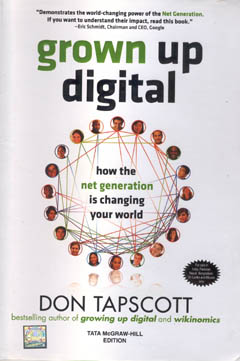Grown Up Digital: How the Net Generation is Changing Your World
By Don Tapscott.
Tata McGraw-Hill. Pages 368. Rs 595.
Review by Roopinder Singh

JUST replace ‘our’ in the headline with ‘my’ and you will have every parent agreeing to your statement, even as they despair about the fragmented attention spans, horrible music that they listen to and the inordinate time that they spend on digital devices—net books, cell phones, play stations and computers—that seem to become extra digits on their fingers.
Elders complain that teenagers and children are easily distracted, self-obsessed and have no work ethics and discipline. Don Tapscott, a Canadian who wrote Growing Up Digital in 1996, is a chronicler of the world of digitisation with many previously well-received works. This book is written by someone passionate about both the digital world and its users.
A sympathetic elder who seeks to understand the world evolving around him, Tapscott was given insights by his children, Alex and Niki, much as parents find their children teaching them how to use the latest gadget. Now, it so happens that this overturns the instruction model that was thought to be eternal—of elders passing on knowledge to the younger generations.
The Wellington Girls School in New Zealand acquired computers, but the teachers did not know how to use them—a familiar scenario. In 1990s, Margaret McLeod became principal and formed a team of Tech Angles, students who taught the teachers computer basics. It became a ‘revolutionary’ approach to education because it acknowledged that the kids were authorities in this particular field. For some time the role reversal worked, but teachers resented the erosion of their authority, and soon the system went back to normal, ‘broadcast’ model of teaching.
But broadcasting is so yesteryear. Anyone who used the Net realises that linear progression is antediluvian in the hyperlinked world of today. Interactivity is the key and the Net Generation is an expert at using it far beyond what the originators of the Internet envisaged, so much so that the Net itself has now evolved to Net 2.
As the author says: “Sure, you’re as cyber-sophisticated as the next person … . But young people have a natural affinity for technology that seems uncanny. They instinctively turn first to the Net to communicate, understand, learn, find and do many things.”
A $4-million study that Tapscott led and uses often in the book found surprising similarities among the 7,685 Net Geners in the 12 countries they studied. When we were introduced to the Net, we found it a remarkable medium to send across information across the world. Today, the study has found that the Net Geners are truly trans-national, they seek linkages, they work in partnerships.
As employees, the Net Geners are quick adapters, think out of the box but are easily bored. They expect work to be ‘fun’— can you imagine! So taping them requires a totally different approach—they want instant appraisals of their work, not yearly ones, they want everything customised and they value transparency.
Net Geners are essentially collaborators, and their games and skill sets tell them that there are many solutions to a problem and they get results faster if you work with others. They are making corporations to rethink their management models and even work cultures, and those that do so benefit handsomely
Tapscott examines how family dynamics have changed now, and again, the old orderly world of authority flowing from the top has been turned upside down. Not that Net Geners want to be totally free, they actually want love, affection and even limits, but also to have their say in family affairs.
The picture that Tapscott paints is not all rosy. He takes a sharp look at how the Net Geners reveal too much of their lives online, oblivious of the impact such indiscretions will have at a later stage. There have been many cases of employers rejecting potential employees after checking out their profile on social networks like Facebook, Orkut, MySpace, etc. He is also concerned about the inadequacy of the education system worldwide to use the Net and thus enrich student’s lives.
Net Geners’ voices figure prominently and give an interactive subtext. As expected in this fast evolving world, Tapscott’s latest book needs an update, since it talks of Candidate Barack Obama and so on. Well, he has a website dedicated to it. There is also a blog—the writer practices what he preaches, and those who read his book will find many echoes of their experiences and perceptions in what he and thousands who corroborated (most electronically through Facebook, online questionnaires etc.) in the writing of the book.
The book review was published in The Tribune on Sunday, October 11, 2009
